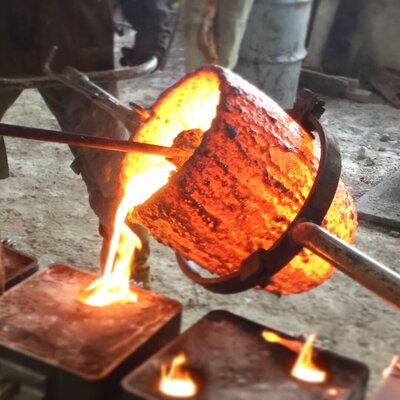You will explore and develop ideas directly expressed in metal.
The method of exploration on this course is through demonstration of technique, followed by individual practice and direct making - shaping, forming and composition of elements.
A range of metalwork and shaping techniques are demonstrated by the tutor throughout the course. You will then follow with practice and application, supported by the tutor.
You may bring ideas of your own for a piece or project to work on while on the course, subject to the constraints of practicality, time availabe and the agreement of the tutor, or you may evolve an idea to work on in relation to techniques shown. You may bring your own existing found objects or elements to include in your exploration, subject to agreement with the tutor.
Techniques and possibilities are shown by example, enabling you to explore and evolve individual sculptural composition as the course progresses, potentially leading towards a finished piece.
Direct metal shaping techniques will be demonstrated using different methods and tools to develop and manipulate metal through cutting, abrasion, using different heats to control and directly shape the material, welding, tapering, forged changes and developments of of cross section, curving, bending and texturing.
By the end of the course, you should feel more confident with understanding and recognising how these metal techniques may be applied in sculptural metalwork. You should be able to confidently undertake further explorations of this fascinating and rewarding area of metal sculpture.
Included
The College will supply all materials required for the specific project set by the tutor, including all fuel costs and mild steel stocked by the College.
Leather aprons, welding gauntlets, goggles, welding helmets and ear defenders can be borrowed from the Forge.
What students need to bring
-
Sketchbook/notebook, pencil, eraser.
-
You will need to wear clothing suitable for workshop use, together with steel toe capped boots. Please note that cotton or wool clothing is preferable to nylon or other synthetics. Shorts do not provide necessary protection. For your safety, it is mandatory to wear steel toe capped safety boots when undertaking a course in the Forge. You must provide your own footwear and bring them with you to wear on the course. If you fail to bring suitable footwear, you will not be able to take part in the course. Safety boots can be purchased from most tool hire shops and builders merchants, as well as online.
-
You must wear goggles (provided) and suitable protective clothing for this course. Leather aprons, welding gauntlets, goggles, welding helmets and ear defenders can be borrowed from the Forge or you can bring them along if you have them. If, for example, you have particularly large or small hands, your own leather work gloves are likely to be a better fit.
Available to buy
Available from shop:
Sketchbook/notebook, pencil, eraser
Additional information
Please note: This course will be in the Forge, which is a 10-minute walk from the main house through the walled garden or can be accessed by car. Morning coffee and afternoon tea will be held in the nearby Carrington Studio.
Please note that tutor supervision is always required when you are working in the Forge.
Please wear appropriate clothing/aprons for the workshop or studio, this includes stout covered footwear (no sandals or open toes).
Arrival day
Residential students can arrive from 4pm, non-residential students to arrive by 7.15pm for registration. Students arriving earlier are welcome to purchase dinner in the College Dining Room from 6pm.
Students meet their tutor in the Bar at 7.30pm prompt to go to studios.
First Teaching session: 7.30pm - 9pm (attendance is essential)
Daily timetable
Course teaching: 9.15am - 5pm
Morning session: 9.15am - 12.45pm including coffee/tea break
Lunch break: 12.45pm - 2pm*
Afternoon session: 2pm - 5pm including coffee/tea break
Teaching finishes: 5pm
Evening working: students may have access to workshops until 9pm, but only with permission from the tutor and provided any health and safety guidelines are observed.
Departure day
Course teaching: 9.15am - 3pm
Teaching finishes: 3pm
Residential students will need to check out of rooms by 10am.
Please note, the tutor may make slight variations to the daily timetable as required.
*Lunch can be purchased on campus, view options





